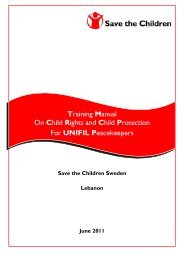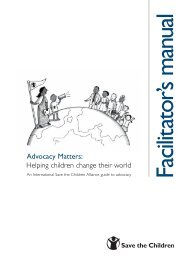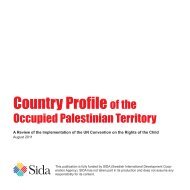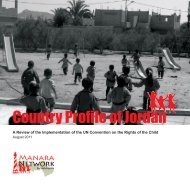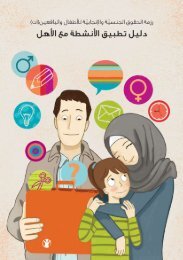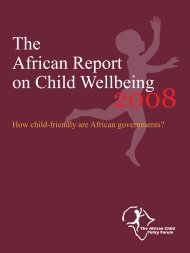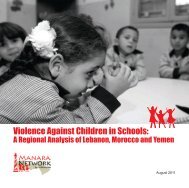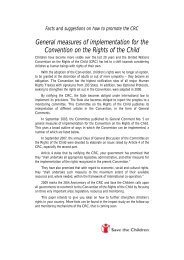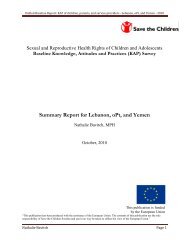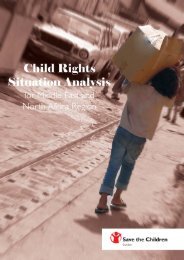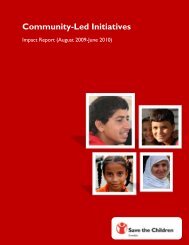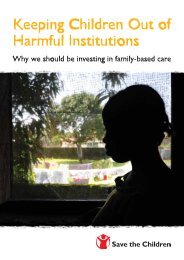Country Profile of Morocco - International Bureau of Children's Rights
Country Profile of Morocco - International Bureau of Children's Rights
Country Profile of Morocco - International Bureau of Children's Rights
Create successful ePaper yourself
Turn your PDF publications into a flip-book with our unique Google optimized e-Paper software.
ficials began a study on street children and commenced an<br />
evaluation <strong>of</strong> the 1992 Action Plan. 54 The Committee also<br />
noted the Kingdom’s creation <strong>of</strong> a national bureau <strong>of</strong> statistical<br />
information to assist in developing more responsive<br />
policies, and the role <strong>of</strong> the National Observatory for<br />
Child <strong>Rights</strong> in assessing progress made on implementing<br />
the CRC. 55<br />
The Committee praised the advancement <strong>of</strong> child participation<br />
through the creation <strong>of</strong> a Child Parliament<br />
and a model city council for children. 56 Gender-based<br />
discrimination was tackled through the National Action<br />
Plan 57 , and efforts made to increase the school enrolment<br />
<strong>of</strong> girls. 58<br />
vi. Main Factors and Difficulties Impeding the<br />
Implementation <strong>of</strong> the CRC and the Optional<br />
Protocols<br />
In its observations, the Committee highlighted a number<br />
<strong>of</strong> issues <strong>of</strong> concern. 59 It critiqued the lack <strong>of</strong> harmony<br />
between national legislation and the CRC and other child<br />
rights instruments, the absence <strong>of</strong> independent monitoring<br />
structures with a mandate to receive and assess complaints<br />
about violations <strong>of</strong> child rights, and the absence <strong>of</strong><br />
a national mechanism for collecting and analysing data on<br />
areas covered by the Convention.<br />
Children at risk and minority groups were <strong>of</strong> particular<br />
concern. Persisting disparities between boys and girls were<br />
noted, along with discrimination against children born out<br />
<strong>of</strong> wedlock. The Committee also expressed its concern<br />
about the large number <strong>of</strong> children who do not enjoy<br />
their rights to an adequate standard <strong>of</strong> living, including<br />
children from poor families, children living in remote rural<br />
areas and street children. High rates <strong>of</strong> illiteracy, particularly<br />
among women, and high dropout and repetition rates<br />
21<br />
“Children at risk<br />
and minority<br />
groups were<br />
<strong>of</strong> particular concern.<br />
Persisting disparities<br />
between boys and girls<br />
were noted, along with<br />
discrimination against<br />
children born out <strong>of</strong><br />
wedlock.”<br />
in the education system<br />
need addressing, said the<br />
Committee. Too many<br />
children are institutionalized<br />
(<strong>of</strong>ten abandoned by<br />
their parents) in institutions<br />
with inadequate living<br />
conditions. In addition,<br />
the Committee expressed<br />
concern over the plight <strong>of</strong><br />
children living in Western<br />
Sahara. 60 Children are <strong>of</strong>ten<br />
exploited economically<br />
as child labourers in the<br />
agricultural and handicrafts<br />
sectors. 61 The Committee criticized the lack <strong>of</strong> policies<br />
and programmes to address a growing number <strong>of</strong> children<br />
living and working in the streets. 62 Further, the Committee<br />
expressed concern over the status <strong>of</strong> child victims <strong>of</strong><br />
sexual exploitation, who can be treated as <strong>of</strong>fenders under<br />
current legislation. 63 Finally, children belonging to the<br />
minority Amazigh community cannot always exercise their<br />
right to their own culture. 64<br />
Legal mechanisms need improvement, the Committee<br />
stated, and national family law revised to incorporate the<br />
principle <strong>of</strong> the best interest <strong>of</strong> the child. The Committee<br />
raised concerns about the lack <strong>of</strong> coordination between<br />
various health programmes, disparities between access<br />
to services in urban and rural areas, and the frequency<br />
<strong>of</strong> disorders caused by iodine deficiency and a decline in<br />
breastfeeding. Reduction in budgetary outlays for education,<br />
said the Committee, effects teachers’ living conditions<br />
and alters the quality <strong>of</strong> teaching.<br />
Finally, the Committee expressed concern that social attitudes<br />
prevented <strong>of</strong>ficials from taking seriously the Child<br />
Parliament and adopting its recommendations.




